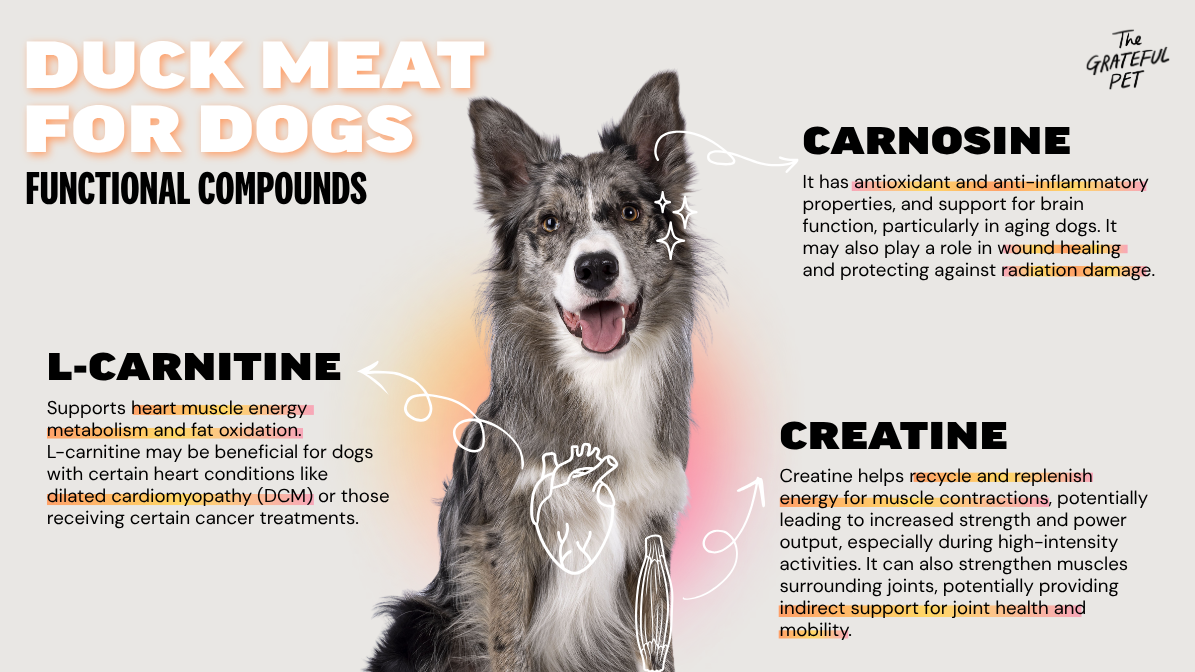Can Dogs Eat Duck? 5 Surprising Health Benefits of Duck Meat for Dogs

If you’ve never considered duck as a source of protein for your dog, you’re not alone. Many pet parents default to chicken or beef without realising that duck is a flavourful, nutrient-rich powerhouse with unique health advantages.
Duck is a highly digestible, species-appropriate protein that’s often overlooked, but it has so much more to offer. From anti-inflammatory nutrients to cooling properties rooted in Traditional Chinese Medicine, duck meat should be included into your pet’s diet. In this blog, we’ll explore five science-backed health benefits of duck for dogs—and why it might just be your dog’s new favourite meal. (P.S. It’s great for cats too!)
A Novel, Allergy-Friendly Protein Source
Duck is considered a novel protein, making it a smart option for dogs with food sensitivities or allergies. While chicken, beef, and lamb are common ingredients in commercial pet food, duck is less frequently encountered—meaning it’s less likely to trigger allergic reactions.
A veterinary study done by Mueller and his team in 2015, showed that food allergies in dogs are most often linked to beef, dairy, and chicken, with one landmark review listing duck as one of the least allergenic meats in elimination trials [1]. That makes duck a safer and effective protein in hypoallergenic or limited-ingredient diets.
Pet parents often turn to duck when managing symptoms like chronic itching, hot spots, or gastrointestinal upset. The rich, savoury flavour also tends to be more palatable than hypoallergenic dry food, making it an excellent choice for picky eaters or dogs recovering from illness.
Rich in Essential Micronutrients and Antioxidants
Duck doesn’t just deliver protein—it also contains key micronutrients that support whole-body health. Compared to other common meats, duck is particularly high in the following vitamins and minerals:
- Iron, which supports red blood cell function and energy
- Zinc, which promotes healthy skin, wound healing, and immunity
- Selenium, a powerful antioxidant that protects against oxidative stress
- B-vitamins, including niacin (B3), riboflavin (B2), and pyridoxine (B6), which support metabolism, skin health, and nervous system function
According to a study published in the Journal of Food Composition and Analysis, duck meat offers higher levels of iron and zinc than chicken or turkey, making it an excellent option for dogs who have a higher requirement for these minerals [2].
These nutrients also play a role in maintaining healthy coats and cognitive function—especially important for aging dogs. For pet parents looking to offer fresh food, gently cooked duck or raw duck meals makes a strong case.
Heart-Healthy Fats and Muscle-Supporting Compounds
Duck also offers a powerful nutritional edge when it comes to supporting your dog’s cardiovascular endurance, muscle health, and recovery. Its nutrient profile includes a balance of heart-supportive fats and naturally occurring compounds that help dogs stay active, agile, and resilient—whether they’re energetic pups or senior pets needing joint and muscle support.
Fresh duck meat for dogs and cats have a naturally higher content of monounsaturated and polyunsaturated fats, including essential omega-3 fatty acids. These fats help maintain heart function, reduce inflammation, and promote brain development. Research has shown that dietary omega-3 supplementation in dogs improves coat quality, reduces inflammatory markers, and supports immune regulation [3].
What sets duck apart is its concentration of functional compounds like:
- L-carnitine which supports heart muscle energy metabolism and fat oxidation
- Creatine which enhances cellular energy and athletic performance
- Carnosine has antioxidant and anti-glycation properties

L-carnitine is especially beneficial for heart health. In a study published in The Veterinary Journal, dogs with dilated cardiomyopathy showed improved cardiac output when supplemented with L-carnitine [4]. Carnosine, found abundantly in duck muscle, helps protect cells from oxidative stress and maintain pH balance in muscle tissue, according to a review study on amino acids [5].
Together, these nutrients help maintain lean muscle mass, support endurance and energy, and reduce the risk of degenerative disease—making duck a smart choice for active dogs, senior dogs, or those recovering from illness.
Cooling and Anti-Inflammatory Properties in Traditional Chinese Medicine (TCM)
In Traditional Chinese Medicine (TCM), duck is classified as a “cooling” or yin protein, known for its ability to clear internal heat, reduce inflammation, and nourish the body’s fluids. This ancient perspective aligns remarkably well with what we now understand through nutritional science.
For dogs with “excess heat” conditions—manifesting as red, inflamed skin, constant itching, restlessness, or inflammatory joint issues—TCM practitioners often recommend cooling proteins like duck to help rebalance the body. In hot, humid climates like Singapore, this becomes especially relevant. Feeding duck can help dogs better regulate their internal systems, particularly those prone to heat sensitivity or chronic inflammatory conditions.
These energetic principles are increasingly being integrated into holistic veterinary care. A veterinary study reported that diets incorporating cooling meats such as duck and pork helped reduce inflammation markers and itch severity in dogs with atopic dermatitis [6].
This is further proven from a scientific standpoint, duck is rich in nutrients that support this anti-inflammatory profile. Selenium and zinc, found abundantly in duck, help modulate immune responses and lower oxidative stress—both of which play a role in managing chronic inflammation seen in skin and joint conditions [7].
So whether you’re looking at it through a TCM or scientific lens, the conclusion is the same: duck is a natural choice for dogs prone to “hot” conditions, both energetically and biologically.
Digestibility and Palatability for Sensitive Stomachs
Duck is often praised not only for its nutritional value but also for its digestibility and taste appeal. It is naturally lower in saturated fat and fresh duck contains higher moisture content which makes it easier to absorb—ideal for dogs with sensitive stomachs, recovering from illness, or entering their senior years. Unlike higher fat proteins like lamb that can demand more from their digestive system.
Incorporating duck into a fresh, minimally processed diet—whether gently cooked or raw—can improve appetite, stool quality, and energy levels, especially in pets with gastrointestinal sensitivities.
Why Choose Duck from The Grateful Pet?

At The Grateful Pet, we believe in the power of real, transformative food. That’s why we use only cage-free duck, prepared in AVS-certified kitchens using either gently cooked or raw methods to preserve nutrition.
Our duck recipes are free from artificial preservatives, fillers, or rendered meats—just wholesome protein, enhanced with Asian and Western superfoods like green-lipped mussels, prebiotic seaweed, and dandelion root. Whether you choose our Gently Cooked Cage-Free Duck or Raw Cage-Free Duck for dogs, your best friend is getting a complete and balanced meal, carefully crafted for health and flavour.
And for our feline friends? Our Raw Duck & Beef meals for cats offers the same nutritional richness in a species-appropriate format.
With fully transparent ingredient lists, BPA-free packaging, and vet-reviewed recipes, The Grateful Pet makes it easy to feed your pets the way nature intended.
References
[1] Critically appraised topic on adverse food reactions of companion animals–Mueller et al., Aug 2015 https://pubmed.ncbi.nlm.nih.gov/26310322
[2] Journal of Food Composition and Analysis–Zhou, April 2010 https://www.sciencedirect.com/science/article/abs/pii/S0309174010001658
[3] Therapeutic use of fish oils in companion animals. Journal of the American Veterinary Medical Association–Bauer, J.E., December 2011 https://pubmed.ncbi.nlm.nih.gov/22087720
[4] B.W. Effects of L-carnitine on dogs with dilated cardiomyopathy–Keene, September 1991 https://pubmed.ncbi.nlm.nih.gov/1949496
[5] Physiology and pathophysiology of carnosine. Amino Acids–Boldyrev, October 2013 https://pubmed.ncbi.nlm.nih.gov/24137022
[6] A Comparison of the Nutrient Composition and Chinese Food Therapy Energetics of Common Canine and Feline Dietary Ingredients– Justin Shmalberg, 2013 https://ajtcvm.org/downloads/a-comparison-of-the-nutrient-composition-and-chinese-food-therapy-energetics-of-common-canine-and-feline-dietary-ingredients/
[7] Supplementation of Micronutrient Selenium in Metabolic Diseases: Its Role as an Antioxidant–Ning Wang et al., December 2017 https://pmc.ncbi.nlm.nih.gov/articles/PMC5758946



